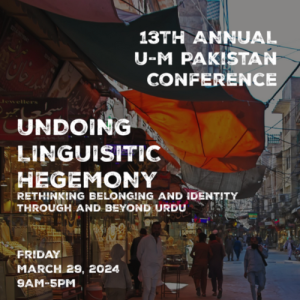13th Annual U-M Pakistan Conference | Undoing Linguistic Hegemony: Rethinking Belonging and Identity Through and Beyond Urdu


This conference interrogates how studies on language use in Pakistan have been conceptualized and received. With an eye towards native linguistic diversity that has challenged colonial-nationalist notions of monolingualism, the 13th Annual Conference on Pakistan seeks to disentangle the relationships between national, regional, and local languages. Historically, studies on languages in Pakistan have highlighted the statewide recognition of Urdu, contesting regionalism established by Punjabi, pre-British Raj Persian courtly and literary works, and, recently, the social status of English in the globalized world. Significantly less attention has been drawn to Pakistan's linguistic pluralism. Drawing upon the groundwork initially established by Tariq Rahman, this conference will serve as a gateway to enrich and complicate the relationships between languages and the ligatures of the state, social movements, literature, devotion, and performance. Using multidisciplinary, multitemporal frameworks to elucidate these relationships, we seek to generate a lively discussion unpacking the language hegemonies associated with Pakistan and their current places within the multilingual spaces that its citizens inhabit. While engaging primarily with Pakistan, we aim to open dialogues that celebrate linguistic diversity across South Asia and its diasporas, particularly as the marks of globalization reveal the everlasting relevance of language recognition and support.
Made possible with the generous support of the Title VI grant from the U.S. Department of Education.
